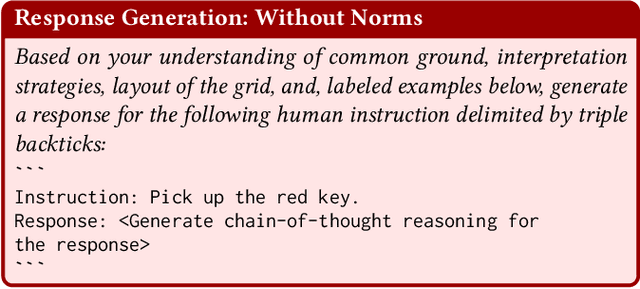Gricean Norms as a Basis for Effective Collaboration
Paper and Code
Mar 18, 2025



Effective human-AI collaboration hinges not only on the AI agent's ability to follow explicit instructions but also on its capacity to navigate ambiguity, incompleteness, invalidity, and irrelevance in communication. Gricean conversational and inference norms facilitate collaboration by aligning unclear instructions with cooperative principles. We propose a normative framework that integrates Gricean norms and cognitive frameworks -- common ground, relevance theory, and theory of mind -- into large language model (LLM) based agents. The normative framework adopts the Gricean maxims of quantity, quality, relation, and manner, along with inference, as Gricean norms to interpret unclear instructions, which are: ambiguous, incomplete, invalid, or irrelevant. Within this framework, we introduce Lamoids, GPT-4 powered agents designed to collaborate with humans. To assess the influence of Gricean norms in human-AI collaboration, we evaluate two versions of a Lamoid: one with norms and one without. In our experiments, a Lamoid collaborates with a human to achieve shared goals in a grid world (Doors, Keys, and Gems) by interpreting both clear and unclear natural language instructions. Our results reveal that the Lamoid with Gricean norms achieves higher task accuracy and generates clearer, more accurate, and contextually relevant responses than the Lamoid without norms. This improvement stems from the normative framework, which enhances the agent's pragmatic reasoning, fostering effective human-AI collaboration and enabling context-aware communication in LLM-based agents.
 Add to Chrome
Add to Chrome Add to Firefox
Add to Firefox Add to Edge
Add to Edge